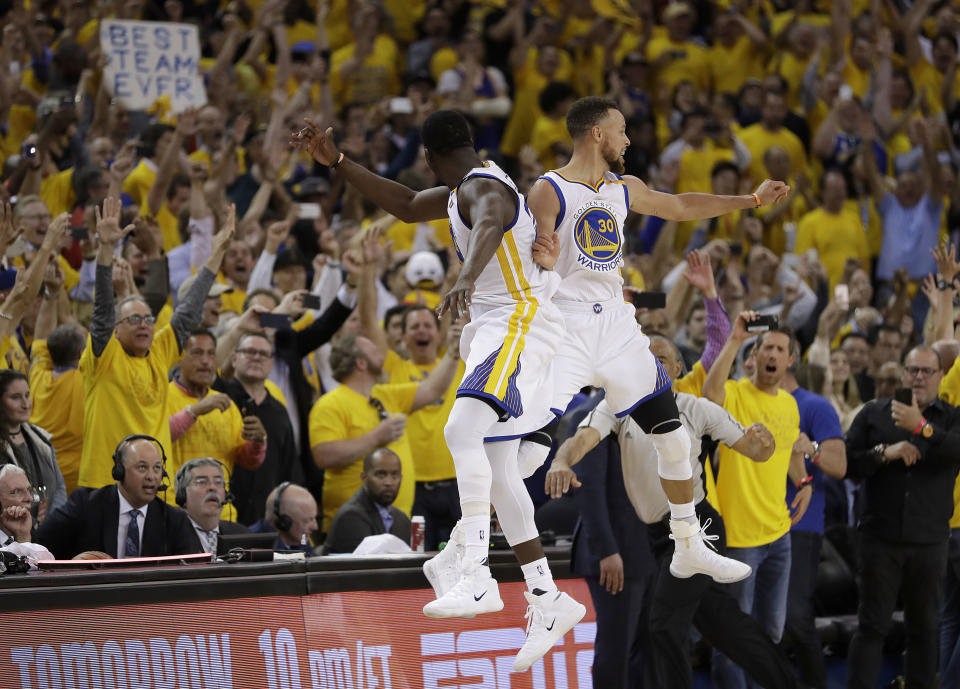The Golden State Warriors are a perfect representation of Silicon Valley
The Golden State Warriors are NBA champs for the second time in three seasons, and this year they did it in particularly dominant fashion, losing just a single game in the playoffs.
Now the backlash begins in full.
Many basketball fans are angry about the dominance of the Warriors because they’re a “super-team,” and their dominance this season has sparked a national debate over whether the NBA should have allowed Kevin Durant, one of the three best players in the league, to join a team that was already stacked.

NBA Commissioner Adam Silver acknowledged, when Durant joined the Warriors one year ago, “I do not think that’s ideal from the league’s standpoint… On the other hand, I absolutely respect a player’s right to become a free agent.” The Warriors, wrote the Orlando Sentinel, “should trouble the NBA.”
This year’s Warriors team boasted three of the 10 best players in the NBA (Steph Curry, Durant, and Draymond Green), and arguably another top-15 player in Klay Thompson. To many, that’s not fair. And when the team won, the complaints went up, and the bitter jokes ensued. (Deadspin put it simply and well: “It was not a fun NBA season nor a fun NBA Finals… the games, writ large, weren’t close and they weren’t dramatic.”)
Warms my heart to see Golden State win a title. The beleaguered ppl of Silicon Valley finally have something to feel happy about #NBAFinals
— Casey Baksa (@caseybaksa) June 13, 2017
Fans aren’t just angry about the team being so dang good—it’s also about everything the team stands for. Yes, the Warriors are a super-team (regardless of what LeBron James says), but they also perfectly exemplify Silicon Valley tech culture.
How could a basketball team represent the tech industry, you ask?
It starts with the ownership.
The majority owner of the Warriors is Joe Lacob, a partner at Kleiner Perkins, one of the top three venture capital firms in the Valley. Kleiner manages more than $1 billion in assets and its investment portfolio is a murderer’s row of big tech names: Airbnb, Nest, Jawbone, Slack, Snap, Spotify, Stripe, Square, Twitter, and Uber, to name a few.
Lacob’s ownership group looks like the lineup of any long oak table inside a VC firm conference room: Chamath Palihapitiya, a former Facebook executive and VC at Social Capital; Mark Stevens, a VC at Sequoia Ventures; Bob Kagle, a VC at Benchmark; and John Walecka, a VC at Redpoint Ventures.
The group bought the team for $450 million in 2010, when the team was not at all good. Six seasons later, it’s the best team in the NBA by a boringly wide margin, and Forbes, in its latest valuation of NBA franchises, pegs its value at $2.6 billion (No. 3), the first time the Warriors have ever been in the top five.
And the venture capitalists appear to believe they deserve the credit for that on-court success. In a New York Times interview last year, Lacob, using somewhat Trump-like language, said, “The great, great venture capitalists who built company after company, that’s not an accident. And none of this is an accident, either.”
Warriors now 1-2 at home since owner Joe Lacob revealed to New York Times Magazine that he's smarter than everyone else.
— Dan Le Batard Show (@LeBatardShow) April 6, 2016
It extends to the crowd at the Warriors games.
A seat at Oracle Arena is the most expensive ticket in town. The worst seats in the house typically run over $500. Tickets to Game 5 in Oakland ran for an average $1,731, a 20% spike from Game 5 last year (in a series between the same two teams).
Who can afford those? Surprise: more Silicon Valley techies. The sidelines at Warriors home games are a row of familiar faces in tech, music, and Hollywood: Salesforce CEO Marc Benioff; Apple exec Eddy Cue; former Oracle CEO Larry Ellison; mega-influential VC Ben Horowitz of Andreessen Horowitz; tech enthusiasts Will.i.am and Ashton Kutcher; Chris Rock; Drake; Rihanna; and Kevin Hart. And how much were courtside tickets to Game 5, which proved to be the final game? One person paid $133,000 for two tickets.
It’s about a lack of parity.
Those staggering numbers put the wealth gap in America on full display—just like the dominance of the Warriors shows the lack of parity in the NBA today. And nowhere is the country’s wealth gap on more stark display than in Silicon Valley, where computer engineers dressed in hoodies make millions, and venture capitalists (predominantly white men) in suits make billions by betting on their future success.
Yes, there’s a retort to the complaints about Silicon Valley: it takes hard work, foresight, and expertise to pick the right horse and crown tomorrow’s tech winners. And the same retort can be made about the current Warriors: they simply have the best team, and will keep winning as long as that’s the case, and that’s sports; deal with it.
But it’s no surprise that NBA fans don’t really want to hear that logic, and why many hate the Warriors so much: the team represents the elite. It is a team built by elites for elites, a team that revels in its riches.
All of this amounts to an optics problem for NBA commissioner Adam Silver. What might he do in the near future to stop the Warriors, or a super-team like them, from winning three, four, five, six seasons in a row?
—
Daniel Roberts is the sports business writer at Yahoo Finance. Follow him on Twitter at @readDanwrite.
Read more:
Cavs-Warriors NBA Finals rematch is also a Nike-Under Armour battle
3 big reasons Under Armour has cooled off
